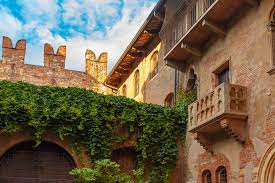Shakespeare and Verona
Shakespeare set about thirteen of his plays wholly or partly in Italy. An incomplete list includes: The Merchant of Venice, Othello, Julius Caesar, The Taming of the Shrew, Much Ado about Nothing, Two Gentlemen of Verona, All’s Well That Ends Well, The Winter’s Tale, Twelfth Night, The Tempest, and of course Romeo and Juliet.
We don’t know for sure what drew Shakespeare to Italy, but it is not hard to find probable reasons. To start with, Italy was attractive because it gave birth to a lot of the literary traditions that Shakespeare draws from, including courtly love, the troubadours, and the sonnet whose earliest form was established by Dante and Petrarch. We know that Shakespeare read translations of Italian work, not just what we now call literature but formative non-fiction as well: Macchiavelli’s The Prince and Castiglione’s The Courtier. It’s also possible that Shakespeare had a relationship with Emilia Lanier (née Bassano), whose father was born in Venice and was a leading court musician to Queen Elizabeth.
Dramaturgically, Renaissance Italy was attractive as a collection of City States. Each city ruled itself, there was a complete range of social classes from the Prince to the peasants, and laws were made and enforced by the city itself. The Church was international rather than national, but in most domestic matters local friars and priests were more or less autonomous. As we know from a number of Shakespeare’s plays, he accorded friars and priests considerable power, not in a hierarchical sense but as meddlers, off-the-books players in the lives of his characters, not least in the lives of Romeo and Juliet separately and together. It is possible that Shakespeare saw in Italy a place where he could highlight dramatically the dynamics of power and love that he observed in London and the courts of Elizabeth.
We know that R&J was based on Arthur Brooke’s Tragical History of Romeus and Juliet, a long poem published in 1562 and reprinted twice by the editor of the Miscellany, Richard Tottel, in 1582 and 1587. Brookes’ poem is itself a distillation of a wide range of stories that go back to folk myth. Most good editions of the play provide excellent accounts and reading lists for anyone interested in the sources. My favorite is Dante’s invective in book 6 of The Divine Comedy, Purgatory, against an Italy that was servile to the feuds between powerful families, in which he invites the Emperor Albert – who was involved in the antipope crises of the early medieval church – to come and see the feuding families, the Montecchi and the Cappelletti (Dante Alighieri, Purgatorio, 6, 76ff).
Dante’s feuding families were not associated with Verona, which during the Medieval and Renaissance periods of Italian history was a relatively small and neutral city. The current mayor of Verona often laughs as he watches the regular influx of tourists; while they come to witness the home of two famous lovers, it is in fact the English play alone that gives the city its reputation. Entrepreneurs in the city have been canny enough to take locations and landmarks from the play and find matching locations in the city itself. Francesco da Mosto, a Venetian writer and architect who presented the BBC series Shakespeare in Italy in 2012, had this to say about Verona:
“In fair Verona, where we lay our scene” – Verona – a wonderful city surrounded by hills arranged like banks of theatre seats – is the city in which Shakespeare’s legacy is felt strongest. There is a saying in Italy that ‘Venetians are great lords, Paduans are great doctors, people from Vicenza eat cats [during wartime, allegedly] and people from Verona are all crazy’. People from Verona are full of life, very funny and welcoming, a curious breed who love to meet visitors and appreciate new influences.
Verona was not thought of as a city of romance before Romeo and Juliet – in fact, not many people would have heard of it as it was very much in the shadow of Venice at that time. It is now regarded as one of the most romantic places in the world, and thousands of lovers visit the city each year.
The city is full of sites associated with Romeo and Juliet. The famous balcony where Romeo is said to have declared his love to Juliet is close to Verona’s main promenade – although since the balcony was apparently added to a suitably old house in 1936, it’s doubtful it is the original! There is a statue of Juliet outside and her bedroom has been recreated inside (Via Cappello 23, 00 39 045 803 43 03). The stone architecture of the building’s courtyard, entered through a little arched passageway, has kept the otherworldly atmosphere of ancient times.
My favourite site in Verona is Juliet’s tomb (Via del Pontiere 9, 00 39 045 800 03 61). It’s in a 13th-century Franciscan convent, where Juliet died in the play – the only one outside the city walls at the time when the events were supposed to have taken place. People go there to pay tribute to Juliet and Shakespeare – even Dickens visited. It really does have a very special atmosphere. It feels like one of the saddest places in the world.”





Leave a Reply
Want to join the discussion?Feel free to contribute!